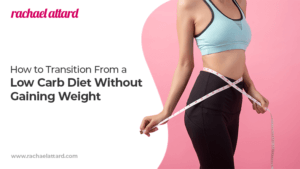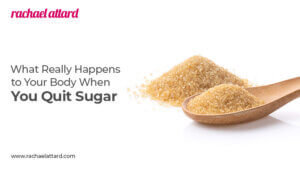What Happens to Your Body When You Stop Eating Carbs
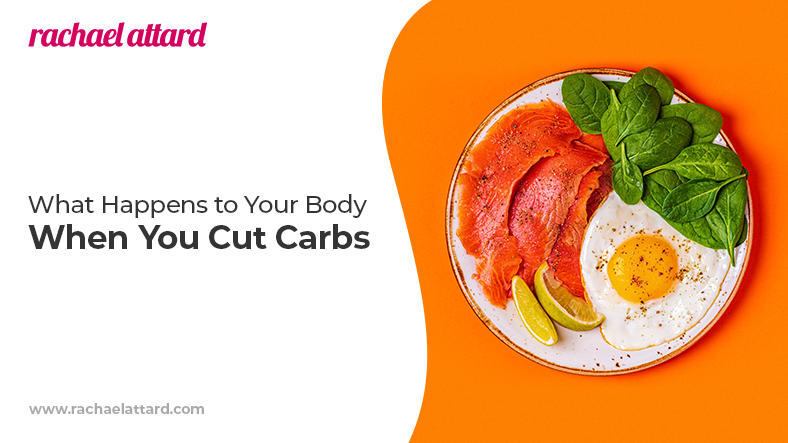
Low-carb diets are pretty popular, and I receive a lot of questions about them. Limiting carbohydrate intake can be beneficial for some people, but it can also cause some difficult side effects. If you want to be sure that this kind of diet would be safe for you, talk to your doctor or a medical professional!
In this article, I will explain what happens in your body when you cut carbs, and I’ll give you some tips on how to limit your carb intake safely. :)
Different Types of Carbs
Like fat and protein, carbohydrates are a type of macronutrient found in food and some types of drinks. Fat and protein are also carbohydrates.
Sometimes, carbs occur naturally, such as in fruit. Other times, foods have added carbs in them, such as in processed foods. Carbs provide your body with energy.
There are three different types of carbohydrates:
RELATED POST: Low Carb Diets – Good Or Bad?
Starches
Starch is considered a complex carbohydrate because it is made up of numerous sugar units bonded together.
You can find starches in plant-based foods, such as vegetables, grains, and cooked dry beans and peas.
Your body takes a while to digest and absorb starches, which means that starches provide a slower release of energy than simple carbohydrates. Because of this, starches are more likely to be used for energy, instead of stored as fat.
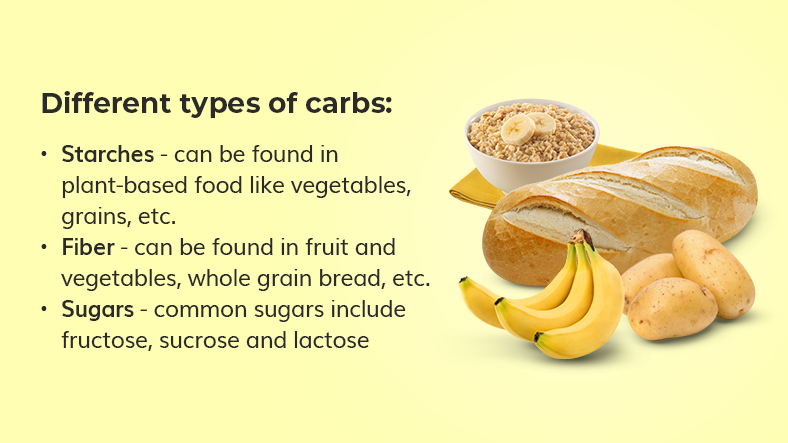
Fiber
Fiber is another complex carbohydrate. Unlike starches (and sugar), fiber can’t be broken down as it goes through the digestive system.
There are two types of fiber:
- Soluble fiber: This type of fiber dissolves in your body. It becomes a gel-like substance, and it decreases blood sugar and lowers blood cholesterol.
- Insoluble fiber: This type of fiber does not dissolve. Instead, it helps food pass through your digestive system quickly. This type of fiber helps keep you regular.
Fruit and vegetables, wholegrain bread, wholewheat pasta, beans, and lentils all contain fiber.
Sugar
Sugar is a simple carbohydrate, and it passes through the body quickly. In general, it is easy for your body to digest and absorb sugar. Because of this, sugars can give you a quick boost of energy that burns out quickly. Sugars also spike your blood sugar.
They’re also easily converted into stored energy (or fat!). Common sugars include fructose, sucrose, and lactose.
RELATED POST: How Much Sugar Should You Have in a Day?
Why Do We Need Carbs?
Sometimes, carbs are seen as bad food or foods to avoid. Some people have had success cutting carbs, and prefer low-carb diets like keto.
However, carbs are essential to your health, and they are very difficult to avoid completely. Here’s why:
Carbs Provide Energy
Carbs are your body’s go-to source for energy. When you eat carbohydrates, your body breaks down the sugars and starches into simple sugars. Your bloodstream absorbs these simple sugars, where they become blood sugar (or blood glucose).
Then, insulin helps the glucose enter into your body’s cells. Your cells use glucose for energy. That energy is needed to breathe, go for a walk, and do other daily tasks.
Your brain accounts for about 20% of your body’s energy, and it consumes about 120 grams of carbohydrates per day.
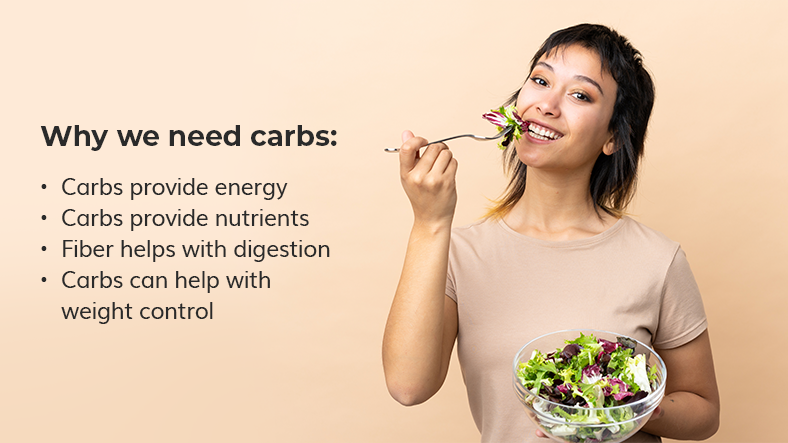
Carbs Provide Nutrients
Carb-heavy food, like fruits, vegetables, and grains, is full of nutrients that keep you healthy. Healthy sources of carbohydrates contain minerals, vitamins, and antioxidants. They help keep your body functioning well, and they support your:
- Immune system
- Metabolism
- Digestive system
These nutrients also help you have healthy skin, bones, blood, muscles, and cartilage.
RELATED POST: 5 Nutrition Facts for Fat Loss
Fiber Helps With Digestion
If you eat a low-carb diet, it can be challenging to eat enough fiber.
Fiber is good for your digestive system. It helps to prevent constipation, and it lowers your risk of developing hemorrhoids. People who eat diets that are high in fiber tend to have better bacteria in their microbiome.
Carbs Can Help With Weight Control
Fiber also helps you feel fuller for longer while consuming fewer calories. This can help you control your weight. Fiber also helps lower your risk for Type 2 Diabetes and obesity.
People who eat diets that include healthy carbohydrates tend to control their weight better.
RELATED POST: How to Transition from a Low Carb Diet Without Gaining Weight
How Many Carbs Do We Need?
Most experts say that you should get about 45-60% of your calories from carbohydrates. If you eat 2,000 calories a day, between 900 and 1,300 calories should be from carbohydrates. In other words, somebody who eats 2,000 calories a day, should aim to eat about 225 to 325 grams of carbohydrates a day.
As always, different people will have different needs. If you have unique circumstances or health concerns, talk to a medical professional. :) We recommend different macros for different body types and you find out what your body type is with our FREE Body Type quiz.
Benefits of Cutting Carbs
Even though carbs are beneficial, some people choose to limit how many carbohydrates they eat. Cutting carbs can be helpful to your body too. Here’s how:
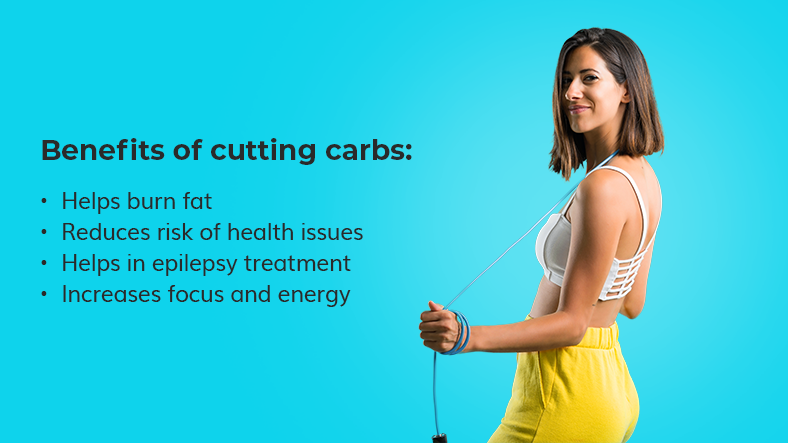
Helps Burn Fat
Studies show that people on low-carb diets tend to lose significant amounts of fat and gain muscle. Low-carb diets are also good at reducing fat around the abdominal area specifically.
When you cut carbs, you reduce your body’s insulin level. Insulin is a hormone that brings the sugar (glucose) from carbs into the body’s cells. One of the things that insulin does is help your body store fat. Low-carb diets can help with fat loss because they reduce your levels of this hormone.
The keto diet is one popular low-carb diet. On this diet, you eat very few carbs. As a result, your body begins to use fat, instead of carbohydrates, as an energy source. One study showed that people on keto lost 2.2 times more weight than people on low-fat, calorie-counting diets. You can read more about my thoughts on keto here. :)
RELATED POST: Fat Burning Zone – Learn How to Burn More Fat
Reduces Risk of Health Issues
Low-carb diets have been associated with lower risk for several health conditions and diseases, including:
- Heart disease
- Type 2 diabetes
- Metabolic syndrome
- Parkinson’s disease
Low-carb diets help reduce the risk of medical conditions by helping people lose weight and eat more healthy food (like more vegetables) into their diets.
Helps in Epilepsy Treatment
Epilepsy is a relatively common neurological condition in which people have recurring seizures.
People who have epilepsy can take anti-seizure medication, but these meds aren’t always enough to help their condition. Some people with epilepsy successfully use the keto diet to help manage their seizures. In fact, some people have even seen their seizures go away completely.
RELATED POST: Keto Diet and Intermittent Fasting – Should You Combine Them?
Increases Focus and Energy
At first, people who try low-carb diets often feel tired and experience brain fog. But people who are on the diet for long periods often say they feel more energized and are able to focus better.
Getting rid of simple carbs can also be a great way to improve your energy levels. When you eat simple carbs, you tend to get a boost of energy — and then a slump! Eating complex carbs instead will help balance this out and give you a steadier source of energy.
Side Effects of Cutting Carbs
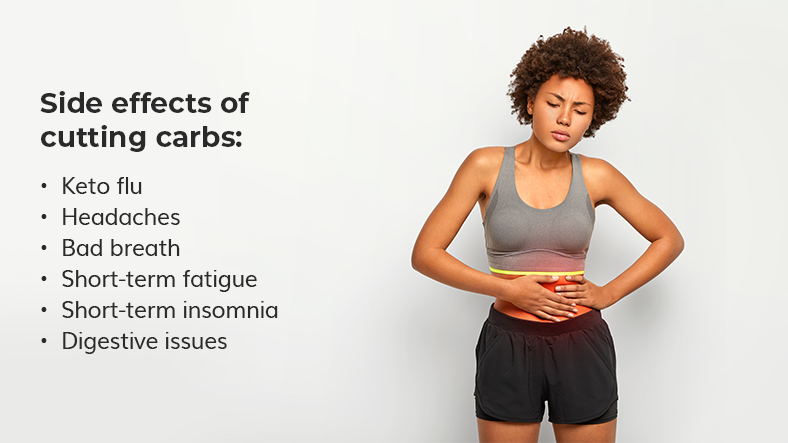
Keto Flu
When you first start a low-carb diet (especially keto), you might feel sick for the first week or so. This is called the keto flu, and it should go away after your body adjusts.
This isn’t an official medical sickness, and doctors aren’t sure exactly why it happens. Some think it is due to sugar withdrawal. Others think that is your body’s response to changes in your gut bacteria, and others think that it might even be an immune system response.
Everybody reacts differently, but some of the most common symptoms include:
- Fatigue
- Brain fog
- Headaches
- Bad breath
- Stomach problems
- Trouble sleeping
- Cramps and sore muscles
- Sugar cravings
Headaches
Some people who reduce their carb intake find that they get frequent headaches that don’t go away. The headaches can be extreme, and some people can’t treat them through standard over-the-counter pain relievers.
Bad Breath
This is actually a pretty common side effect of low-carb diets. If you choose to cut carbs, be sure to keep some mints or sugar-free gum in your purse. :)
The bad breath comes from an increase in acetone levels. Acetone is a ketone that exits your body through your breath and urine.
Short-Term Fatigue
When you give up carbs, your body no longer has its number one source of energy. This can make you tired quickly. This typically improves after 7-30 days.
People who are adjusting to a low-carb diet should drink plenty of water and electrolytes. Try getting 1,000 mg of potassium and 300 mg of magnesium to help with your fatigue.
Short-Term Insomnia
You might experience insomnia or restless sleep when adjusting to a low-carb diet. However, this resolves after a few weeks for most people. In fact, many people on the keto diet say that they sleep better than before.
RELATED POST: What Happens to Your Body When You Don’t Sleep
Digestive Issues
Constipation and diarrhea are common side effects of a low-carb diet. These problems might improve after several weeks, but some people continue to struggle with digestive issues the entire time they are on the diet.
To help solve this problem, it is important to try to eat foods, like low-carb vegetables, that contain fiber.
How to Safely Reduce Your Carb Intake
Reducing your carbohydrate intake can be a great decision for your health, especially if you notice that you eat a lot of simple carbs.
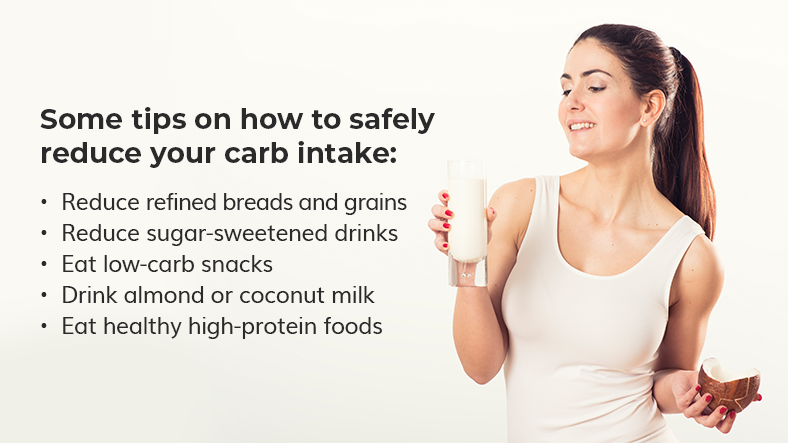
Reduce Refined Breads and Grains
Refined bread and grains are typically really high in simple carbs and low in fiber.
Grains are pretty common parts of most people’s diets, and you don’t need to eliminate them completely. Instead of picking refined options, try to find whole-grain alternatives to eat. These tend to have more fiber and will help keep you satisfied for longer.
Reduce Sugar-Sweetened Drinks
Lots of drinks contain a lot of sugar (and calories). If you want to cut carbs, consider significantly reducing the sweet beverages your drink.
Some sugary drinks you could skip on include::
- Fruit juice (these often include a lot of sugar without the benefit of fiber)
- Energy drinks
- Soda
- Flavoured coffees
- Cocktails
- Sweet iced tea
If you struggle to drink plain water, try drinking sparkling water or fruit-infused water instead. You can add lemon, orange, berries, or more to water to help it taste delicious. Some people even like to add cilantro, mint, or basil to their water.
Eat Low-Carb Snacks
A lot of go-to snacks, like crackers, are high in carbs. Try to keep low-carb options with you so that you can avoid easy high-in-carb alternatives. Some great snacks include:
- Nuts, like almonds and hazelnuts
- Cheese
- Hard-boiled eggs
Drink Almond or Coconut Milk
Dairy milk contains lactose, which is a simple carbohydrate. If you drink a lot of milk, consider picking coconut or almond milk instead to help reduce your carb intake.
Most milk alternatives contain less than 2 grams of carbs per serving.
Eat Healthy High-Protein Foods
Foods that are high in protein will help you feel fuller, which might help you feel less of a need for carbs.
Some foods that have a lot of protein include:
- Cheese
- Greek yoghurt
- Meat and fish
- Eggs
- Nuts
RELATED POST: 8 Healthy High Protein Snacks
Read Food Labels
One of the best ways to limit your carb intake is to not eat them accidentally. Read food labels to understand what you’re putting in your body! Be sure to pay attention to the serving size too. :)
Talk to Your Doctor
If you’re transitioning to a low-carb diet or simply want to eat less, talk to your doctor. They’ll be able to help you adjust in a way that’s best for your body’s needs. :)
Do you have any more questions about low-carb diets? Let me know in the comments.
Love Rachael Xx


